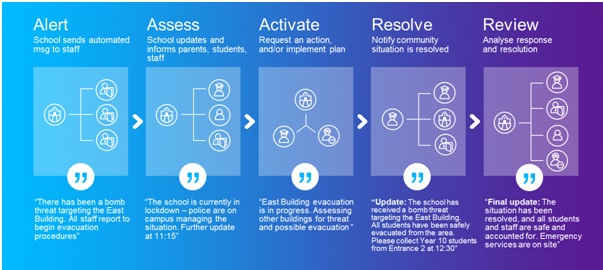Stuff happens
As a full-time working mum I know what it is like to leave a precious child in the hands of others. Each day many of us bring our kids to school or kinder. We've made sure their clothes are perfect and they have a nice lunch (that they will hopefully eat!). But what happens if there was an incident at the school that was bigger than a bump on the head? How would the school communicate with me?
We are extremely fortunate to live in the 'lucky country' where we may not be exposed to some of the dangers that other countries face. However, there is no escaping that stuff happens. In 2016 alone, we have seen schools in every state affected by a range of situations - some real and some threatening hoaxes - that have led to lock downs.
Almost every school in Australia would have processes and methods in place for dealing with an incident or emergency. The communication element of these processes range significantly from fully automated to manually calling all impacted parties.
Mobile devices have become a 'digital limb' for many of us. We should leverage that and make them a tool to help keep our kids safe. Using mobile devices can be a fast, effective, consistent and simple way to communicate critical incidents to authorities, students, teachers and parents.
There are three main things you need to deliver with effective crisis communication:
1. Effective duty of care and safety
2. Peace of mind to staff, students and parents and the community at large
3. The necessary standards of prevention measures to be enhanced
By embracing mobile technology, this can be easily achieved for any school. However, this would become even more powerful if it was adopted at a state department level,so that all schools could have an effective and consistent way to communicate to parents, the authorities and government officials.

And really, why stop at schools? 'Stuff' happens in every walk of life, not just at schools. As an employer, our main concern should be the safety of our staff in the case of an incident.
Crisis communication should be on everyone's agenda, regardless of what industry they work in.
Transport, Mining, Construction and Manufacturing industries have some of the highest numbers of workplace fatalities. It is essential that businesses in these industries make safety a priority and adopt the best practices for communicating incidents effectively and efficiently.
Likewise, hospitals are impacted by threats, suspicious parcels and infection outbreaks that require rapid communication.
I look at my own industry, where flexible working is becoming the norm. As a result, we need to have flexible and innovative ways of communicating incidents to large numbers of potentially impacted employees in a variety of locations.
'Stuff' happens, but it is our duty as employers to make sure we have the right processes to activate emergency operating procedures fast, including to communicate at scale immediately. A successful crisis response defined by the capacity to assess and act quickly and decisively whilst communicating to impacted groups, the community and stakeholders.
For more mobility, go to Telstra Exchange.